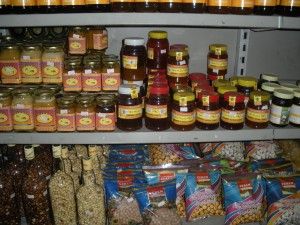
Publisher:
Bonnie King
CONTACT:
Newsroom@Salem-news.com
Advertising:
Adsales@Salem-news.com

~Truth~
~Justice~
~Peace~
TJP
Jul-14-2011 14:38

 TweetFollow @OregonNews
TweetFollow @OregonNews
Targeting Gaps in the Food Supply Chain: Going Beyond Agricultural Production to Achieve Food Security
Danielle Nierenberg for Salem-News.comWorldwatch's Nourishing the Planet team highlights innovations in information technology, market access, and communication that improve livelihoods and food security.
 Farmers need the right tools, including access to markets to sell their products, in order to improve their livelihoods. (Photo credit: Bernard Pollack) |
(WASHINGTON D.C.) - Agricultural production is only the first step in moving the world's food from farm to fork, according to Nourishing the Planet, a project of the Worldwatch Institute. The other links in the food chain - harvesting, packaging, storing, transporting, marketing, and selling - ensure that food actually reaches consumers. Inefficiencies in these activities, rather than just low yields or poor farming techniques, are often to blame for food shortages and low prices for growers.
"Many of the farms and organizations we visited in Africa seemed to have the most success reducing hunger and poverty through efforts that had little to do with producing more crops," said Nourishing the Planet director Danielle Nierenberg, who spent two years traveling across sub-Saharan Africa researching food chains in over 25 countries.
With the United Nations projecting a global population of more than 9 billion by 2050, increasing food chain efficiency will become ever more essential. Producers and consumers must be part of a food chain that feeds the world, provides fair prices to farmers, and works in harmony with the environment. "When groups of small farmers better organize their means of production - whether ordering the right inputs at the right time or selling their crops directly to customers - they become more resilient to fluctuations in global food prices while also better serving local communities," said Robert Engelman, Executive Director of Worldwatch.
Nourishing the Planet (www.NourishingthePlanet.org is a two-year evaluation of environmentally sustainable agricultural innovations to alleviate hunger and poverty. Worldwatch researchers traveled to 25 countries across sub-Saharan Africa to meet with more than 350 farmers groups, NGOs, government agencies, and scientists, highlighting small-scale agricultural efforts that are helping to improve peoples' livelihoods by providing them with food and income. The findings are documented in the recently released report, State of the World 2011: Innovations that Nourish the Planet.
In State of the World 2011, contributing author Samuel Fromartz uses the example of corn production in Zambia to illustrate how off-farm inefficiencies exacerbate food insecurity and poverty. Poor market access, unpredictable weather patterns, and insufficient infrastructure make small-scale agriculture a high-risk livelihood. Seasons of surplus corn production can be as detrimental as low-yielding ones. Large surpluses saturate local markets, and local farmers have no alternatives for selling their product. "Many do not have the luxury of picking when to sell or whom to sell to; they are desperate and need to sell to eat. So they take whatever price they can get," writes Fromartz.
Source: Nourishing the Planet
 |
Articles for July 13, 2011 | Articles for July 14, 2011 | Articles for July 15, 2011





Salem-News.com:
Terms of Service | Privacy Policy

All comments and messages are approved by people and self promotional links or unacceptable comments are denied.
July 14, 2011 3:19 pm (Pacific time)
salem-news..you do know that worldwatch is a globalist, NWO, monsanto controlled group right? Their sustainability practices are GMO, monsanto seeds... carbon credits etc.
Editor: No, I did not. I run through these pieces looking for signs of that, I have opted to carry these and will strongly consider not carrying them under these conditions. Many people send in contributions, Danielle is not a staff writer here.
Anonymous July 14, 2011 3:24 pm (Pacific time)
and the author of this article Danelle?....Her knowledge of global agriculture issues has been cited widely or published in The New York Times, USA Today, the International Herald Tribune, The Washington Post, BBC, the Guardian (UK), JERUSALEM TIMES, etc.. Not the resume I would want behind my research. Now we can add salem-news
[Return to Top]©2026 Salem-News.com. All opinions expressed in this article are those of the author and do not necessarily reflect those of Salem-News.com.